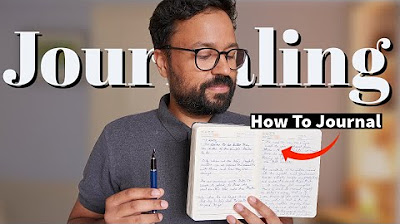Journaling Didn't Work for Me Until I Was Told This
Summary
TLDRThe speaker emphasizes the importance of journaling for personal empowerment, sharing their struggle with traditional journaling methods and advocating for a 'brain dump' approach. They suggest that journaling should be flexible and personal, not confined to daily structured entries. The speaker recommends using a portable, aesthetically pleasing notebook and encourages viewers to adapt journaling to their own style for maximum benefit.
Takeaways
- 📔 Journaling is a powerful tool for personal empowerment.
- 📅 The speaker initially felt obligated to fill each journal entry with detailed daily accounts but found that approach unhelpful.
- 💡 It's okay to have days where you only write a few sentences in your journal; it doesn't have to be exhaustive.
- 🗒️ The concept of a 'brain dump' journal is introduced as a solution to the pressure of daily structured entries.
- 🚫 The speaker encourages letting go of the idea that journaling must be done daily or in a certain way.
- 📱 Journaling can be done in various formats, including on paper, a phone, or a computer, whatever works best for the individual.
- 🔖 Having a portable journal that fits in your pocket can make it easier to capture thoughts on the go.
- 🌲 The speaker prefers Field Notes notebooks for their aesthetics and portability, but emphasizes that personal preference is key.
- 🧠 Journaling helps to clear the mind and deal with intrusive thoughts by getting them out on paper.
- 🔑 Looking back at past journal entries can provide perspective and reassurance, especially when dealing with recurring issues.
- 🎨 Personalize your journaling process to fit your style and preferences, as this will increase the likelihood of consistency.
- 🌟 Journaling can bring clarity and improve life in many areas, but it's essential to do it in a way that works for you.
Q & A
What does the speaker believe is one of the most important things for personal empowerment?
-The speaker believes that journaling is one of the most important things for personal empowerment.
What challenge did the speaker face with traditional journaling methods?
-The speaker struggled with the idea that every journal entry needed to follow a formal structure, such as writing a detailed account of the day, which didn’t always align with their daily experiences.
How does the speaker suggest approaching journaling differently?
-The speaker suggests using a 'brain dump' approach, allowing journaling to be more informal and flexible, where you can jot down thoughts, ideas, or lists without the pressure of formal entries.
What is a 'brain dump' journal according to the speaker?
-A 'brain dump' journal is a space where you can write anything, such as random thoughts, ideas, lists, or notes without the need for structure or detailed daily entries.
Why does the speaker prefer using a physical notebook for journaling instead of a digital method?
-The speaker prefers using a physical notebook because it eliminates distractions, like emails and social media, and allows them to focus solely on their thoughts without the need for charging a device.
What kind of notebook does the speaker use, and why do they like it?
-The speaker uses a Field Notes notebook, especially the National Parks editions, because they appreciate the aesthetics and enjoy carrying it in a leather journal cover that fits in their pocket.
How has journaling helped the speaker deal with intrusive thoughts?
-Journaling has helped the speaker by allowing them to release intrusive thoughts onto paper, which provides mental clarity and helps them manage ongoing struggles, such as health anxiety.
What personal benefit has the speaker found from reviewing past journal entries?
-The speaker finds comfort in reviewing past journal entries because it reminds them that previous worries or anxieties often didn’t materialize, providing reassurance and perspective.
What is the speaker’s key advice for making journaling work for yourself?
-The speaker advises making journaling your own by discarding preconceived rules or methods and shaping it according to what works best for your personal style and needs.
Why does the speaker emphasize using something aesthetically pleasing for journaling?
-The speaker believes that having an aesthetically pleasing notebook encourages more frequent use, as they feel more motivated to take it out and write in it.
Outlines

Cette section est réservée aux utilisateurs payants. Améliorez votre compte pour accéder à cette section.
Améliorer maintenantMindmap

Cette section est réservée aux utilisateurs payants. Améliorez votre compte pour accéder à cette section.
Améliorer maintenantKeywords

Cette section est réservée aux utilisateurs payants. Améliorez votre compte pour accéder à cette section.
Améliorer maintenantHighlights

Cette section est réservée aux utilisateurs payants. Améliorez votre compte pour accéder à cette section.
Améliorer maintenantTranscripts

Cette section est réservée aux utilisateurs payants. Améliorez votre compte pour accéder à cette section.
Améliorer maintenantVoir Plus de Vidéos Connexes

How To Journal For Self Growth (And Make It A Habit !!)

6 Ways to Process your Feelings in Writing: How to Journal for Anxiety and Depression

The happy secret to better work | Shawn Achor

5 Ways to Journal (And Why You Should)

Por esto, deberías de escribir un DIARIO... | CARE

Writing over Infinite Scrolling | Journal like a Scientist
5.0 / 5 (0 votes)
